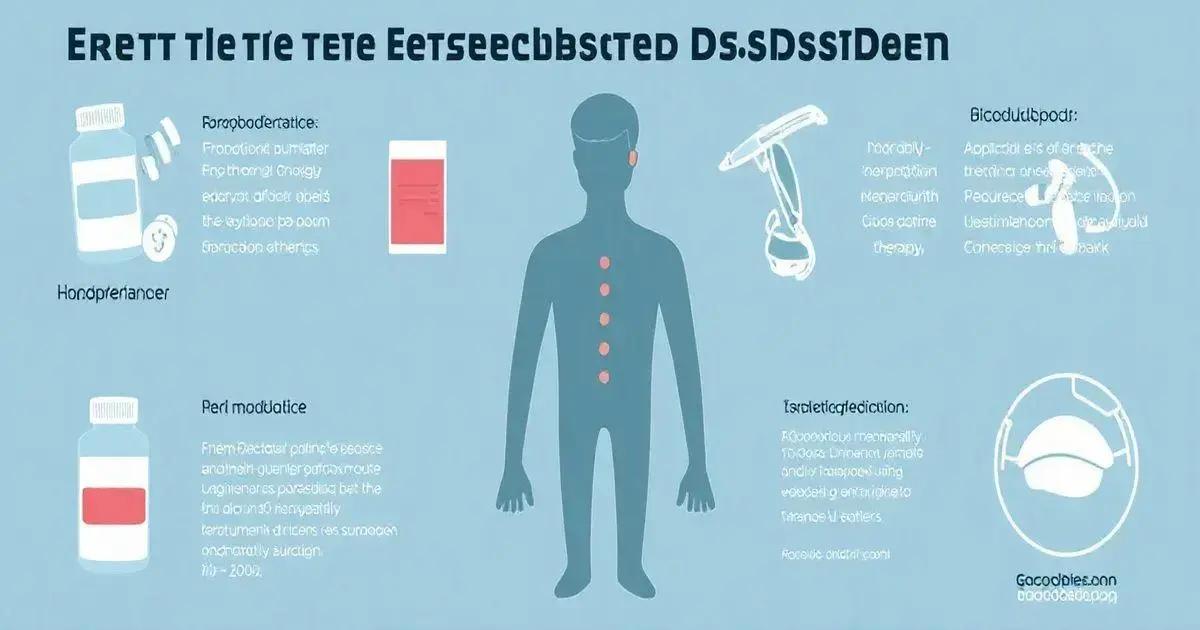When to see a specialist for erectile dysfunction (ED) includes recognizing persistent issues, emotional factors, or accompanying health conditions. Common causes involve heart disease, diabetes, and psychological stress. Treatment options range from oral medications to therapy, while preventive measures like a healthy lifestyle can improve sexual health.
Erectile dysfunction (ED) is a common condition affecting many men. Knowing when to see a specialist for erectile dysfunction can drastically improve your quality of life. If you are experiencing difficulties with sexual performance, or if your confidence is waning due to ongoing issues, it’s essential to seek professional evaluation. In this article, we will discuss common causes of ED, signs indicating the need for a specialist, available treatment options, and preventive measures to maintain healthy sexual function.
Understanding Erectile Dysfunction

Erectile dysfunction (ED) is the inability to achieve or maintain an erection suitable for sexual intercourse. It is more common than many people think and can affect men of all ages, although it is more prevalent in older men. Understanding erectile dysfunction involves recognizing that it can have various physical and psychological causes.
Physical Causes
Many medical conditions can contribute to ED, including heart disease, diabetes, and high blood pressure. Hormonal imbalances, such as low testosterone, can also play a role. Additionally, lifestyle factors such as obesity, smoking, and excessive alcohol use are significant contributors to erectile dysfunction.
Psycho-emotional Factors
ED is not always a physical problem. Stress, anxiety, and depression can significantly impact a man’s ability to perform sexually. Sometimes, past experiences or performance anxiety can create a cycle of dysfunction, making it difficult to regain confidence.
Common Myths about ED
There are many misconceptions surrounding erectile dysfunction. Some believe it is a normal part of aging, while others think that it only happens to older men. However, ED can occur at any age and is treatable.
Importance of Diagnosis
Understanding the root cause of erectile dysfunction is crucial. A proper diagnosis from a qualified healthcare provider can lead to effective treatment options and help address underlying health issues. Open communication about sexual health is important for overall wellbeing.
Common Causes of ED

Many factors can lead to erectile dysfunction (ED). Understanding these common causes is vital for seeking appropriate help.
Heart Disease
Heart problems can affect blood flow. Reduced blood circulation can prevent the penis from becoming erect. This condition is often a sign of ongoing cardiovascular issues.
Diabetes
Men with diabetes are at a higher risk of developing ED due to nerve and blood vessel damage. High blood sugar levels can impact your ability to achieve an erection.
Obesity
Being overweight can lead to ED. Excess body fat can affect hormone levels and blood flow, making it difficult to maintain an erection.
Stress and Anxiety
Psychological factors like stress, anxiety, and depression can interfere with sexual arousal. These emotional challenges can create a cycle of difficulty with erections.
Hormonal Imbalances
Low testosterone levels can also result in erectile dysfunction. Hormonal changes can affect libido and the ability to achieve an erection.
When to Consult a Specialist

Knowing when to consult a specialist for erectile dysfunction (ED) is vital for your health. It is recommended to seek help if you experience:
Persistent Issues
If you have trouble achieving or maintaining an erection over a period of time, this could indicate an underlying condition. If these issues last more than a few weeks, it’s time to consult a professional.
Emotional or Psychological Factors
If stress, anxiety, or depression affects your sexual health, speaking to a mental health professional can be beneficial. A doctor can help connect these psychological factors to physical symptoms.
Accompanying Health Conditions
If you have other health issues like diabetes, heart disease, or hypertension, seeing a specialist is crucial. These conditions can impact erectile function and should be managed closely.
Changes in Libido
Significant changes in your sexual desire may also warrant consultation. Low testosterone or other hormonal imbalances can impact both libido and erectile function.
Medication Side Effects
If you notice ED after starting a new medication, consult your doctor. Some medications can have adverse effects on sexual performance, and alternative options may be available.
Treatment Options Available

There are several treatment options available for erectile dysfunction (ED), each designed to fit different causes and preferences.
Oral Medications
Medications like Viagra, Cialis, and Levitra are commonly prescribed. These pills work by increasing blood flow to the penis, making it easier to achieve and maintain an erection. It’s important to consult your doctor to find the right option for you.
Therapy
If psychological factors like stress or anxiety are contributing to ED, therapy can help. Talking to a mental health professional about these issues can improve your sexual function.
Vacuum Devices
A vacuum erection device can assist in achieving an erection. This device uses suction to draw blood into the penis and is considered a safe, non-invasive option.
Hormone Therapy
If low testosterone is identified as a cause, hormone replacement therapy may be recommended. This can help restore sexual function and libido.
Surgery
In some cases, surgical options like penile implants may be considered. This is usually a last resort when other treatments have failed. A consultation with a specialist is essential to discuss risks and benefits.
Preventive Measures for ED

Taking preventive measures for erectile dysfunction (ED) can help maintain healthy sexual function throughout life. Here are several effective strategies:
Maintain a Healthy Diet
Eating a balanced diet rich in fruits, vegetables, whole grains, and lean proteins can improve overall health. Foods high in antioxidants and vitamins can enhance blood flow and sexual function.
Stay Physically Active
Regular exercise is crucial for overall health. Activities like walking, running, or cycling can help improve blood circulation and maintain a healthy weight, reducing the risk of ED.
Avoid Smoking and Excessive Alcohol
Smoking can restrict blood flow, which may lead to ED. Limiting alcohol intake is also important, as excessive consumption can harm sexual performance.
Manage Stress
Stress can significantly impact sexual function. Practicing relaxation techniques like yoga, meditation, or deep breathing can help reduce anxiety and improve overall wellbeing.
Regular Health Check-ups
Seeing your doctor for regular check-ups can help detect and manage underlying health conditions. Early intervention can prevent the development of erectile dysfunction.
In Conclusion: Recognizing and Addressing Erectile Dysfunction
Erectile dysfunction (ED) is a common condition that can significantly impact a man’s quality of life. Understanding when to see a specialist is key, and recognizing the common causes can help in addressing the issue effectively.
With various treatment options available, such as oral medications, therapy, and lifestyle changes, men can take proactive steps to manage ED. Furthermore, preventive measures, including a healthy lifestyle and regular check-ups, can help reduce the risk of developing this condition.
By seeking guidance from healthcare professionals, individuals can find personalized solutions and improve their sexual health. Remember, addressing concerns early on can lead to better outcomes and a healthier, more satisfying life.
FAQ – Frequently Asked Questions about Erectile Dysfunction
What is erectile dysfunction?
Erectile dysfunction (ED) is the inability to achieve or maintain an erection suitable for sexual intercourse.
What are common causes of ED?
Common causes of ED include heart disease, diabetes, obesity, hormonal imbalances, and psychological factors like stress and anxiety.
When should I consult a specialist for ED?
You should consult a specialist if you experience persistent erectile issues, changes in libido, or if you have underlying health conditions.
What treatment options are available for ED?
Treatment options include oral medications, therapy, vacuum devices, hormone therapy, and even surgical options in some cases.
Are there preventive measures for ED?
Yes, preventive measures include maintaining a healthy diet, regular exercise, avoiding smoking and excessive alcohol, managing stress, and having regular health check-ups.
Is it normal to experience ED occasionally?
Yes, occasional erectile difficulties can happen to anyone. However, if they persist, it’s essential to seek professional help.













